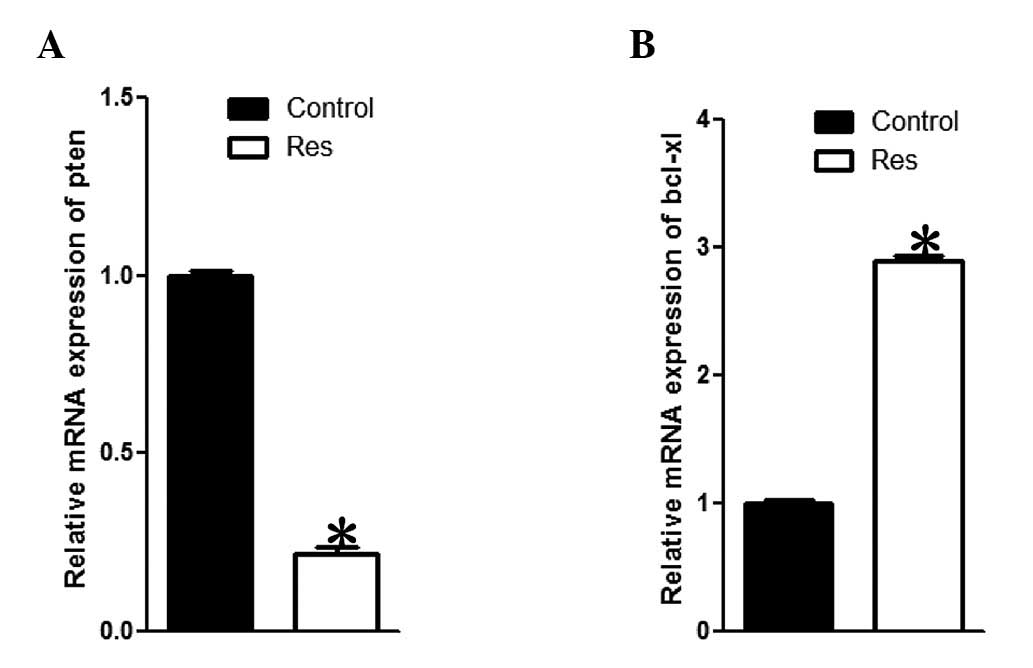|
1
|
Jang M, Cai L, Udeani GO, et al: Cancer
chemopreventive activity of resveratrol, a natural product derived
from grapes. Science. 275:218–220. 1997. View Article : Google Scholar : PubMed/NCBI
|
|
2
|
Baur JA and Sinclair DA: Therapeutic
potential of resveratrol: the in vivo evidence. Nat Rev Drug
Discov. 5:493–506. 2006. View
Article : Google Scholar : PubMed/NCBI
|
|
3
|
Santandreu FM, Valle A, Oliver J and Roca
P: Resveratrol potentiates the cytotoxic oxidative stress induced
by chemotherapy in human colon cancer cells. Cell Physiol Biochem.
28:219–228. 2011. View Article : Google Scholar : PubMed/NCBI
|
|
4
|
Weng CJ, Wu CF, Huang HW, Wu CH, Ho CT and
Yen GC: Evaluation of anti-invasion effect of resveratrol and
related methoxy analogues on human hepatocarcinoma cells. J Agric
Food Chem. 58:2886–2894. 2010. View Article : Google Scholar : PubMed/NCBI
|
|
5
|
Yan F, Tian XM and Ma XD: Effects of
resveratrol on growth inhibition and gap-junctional intercellular
communication of HepG2 cells. Nan Fang Yi Ke Da Xue Xue Bao.
26:963–966. 2006.(In Chinese).
|
|
6
|
Ciolino HP, Daschner PJ and Yeh GC:
Resveratrol inhibits transcription of CYP1A1 in vitro by
preventing activation of the aryl hydrocarbon receptor. Cancer Res.
58:5707–5712. 1998.PubMed/NCBI
|
|
7
|
Wang GL, Fu YC, Xu WC, Feng YQ, Fang SR
and Zhou XH: Resveratrol inhibits the expression of SREBP1 in cell
model of steatosis via Sirt1-FOXO1 signaling pathway. Biochem
Biophys Res Commun. 380:644–649. 2009. View Article : Google Scholar : PubMed/NCBI
|
|
8
|
Lu CC and Chen JK: Resveratrol enhances
perforin expression and NK cell cytotoxicity through
NKG2D-dependent pathways. J Cell Physiol. 223:343–351.
2010.PubMed/NCBI
|
|
9
|
Yu HB, Zhang HF, Zhang X, et al:
Resveratrol inhibits VEGF expression of human hepatocellular
carcinoma cells through a NF-κB-mediated mechanism.
Hepatogastroenterology. 57:1241–1246. 2010.PubMed/NCBI
|
|
10
|
Parekh P, Motiwale L, Naik N and Rao KV:
Downregulation of cyclin D1 is associated with decreased levels of
p38 MAP kinases, Akt/PKB and Pak1 during chemopreventive effects of
resveratrol in liver cancer cells. Exp Toxicol Pathol. 63:167–173.
2011. View Article : Google Scholar : PubMed/NCBI
|
|
11
|
Hiroto Y, Tadokoro K, Tsuda T, et al:
Resveratrol, a phytoestrogen found in red wine, down-regulates
protein S expression in HepG2 cells. Thromb Res. 127:e1–7. 2011.
View Article : Google Scholar : PubMed/NCBI
|
|
12
|
Ma XD, Yan F, Ma AD and Wang HJ:
Resveratrol induces HepG2 cell apoptosis by depolarizing
mitochondrial membrane. Nan Fang Yi Ke Da Xue Xue Bao. 26:406–408.
4132006.(In Chinese).
|
|
13
|
Zhou R, Fukui M, Choi HJ and Zhu BT:
Induction of a reversible, non-cytotoxic S-phase delay by
resveratrol: implications for a mechanism of lifespan prolongation
and cancer protection. Br J Pharmacol. 158:462–474. 2009.
View Article : Google Scholar : PubMed/NCBI
|
|
14
|
Steck PA, Pershouse MA, Jasser SA, et al:
Identification of a candidate tumour suppressor gene, MMAC1, at
chromosome 10q23.3 that is mutated in multiple advanced cancers.
Nat Genet. 15:356–362. 1997. View Article : Google Scholar : PubMed/NCBI
|
|
15
|
Chappell WH, Steelman LS, Long JM, et al:
Ras/Raf/MEK/ERK and PI3K/PTEN/Akt/mTOR inhibitors: rationale and
importance to inhibiting these pathways in human health.
Oncotarget. 2:135–164. 2011.PubMed/NCBI
|
|
16
|
Chu EC and Tarnawski AS: PTEN regulatory
functions in tumor suppression and cell biology. Med Sci Monit.
10:RA235–241. 2004.PubMed/NCBI
|
|
17
|
Li J, Yen C, Liaw D, et al: PTEN, a
putative protein tyrosine phosphatase gene mutated in human brain,
breast and prostate cancer. Science. 275:1943–1947. 1997.
View Article : Google Scholar : PubMed/NCBI
|
|
18
|
Carracedo A, Alimonti A and Pandolfi PP:
PTEN level in tumor suppression: how much is too little? Cancer
Res. 71:629–633. 2011. View Article : Google Scholar : PubMed/NCBI
|
|
19
|
Adams JM and Cory S: The Bcl-2 protein
family: arbiters of cell survival. Science. 281:1322–1326. 1998.
View Article : Google Scholar : PubMed/NCBI
|
|
20
|
Castilla C, Congregado B, Chinchon D,
Torrubia FJ, Japon MA and Saez C: Bcl-xL is overexpressed in
hormone-resistant prostate cancer and promotes survival of LNCaP
cells via interaction with proapoptotic Bak. Endocrinology.
147:4960–4967. 2006. View Article : Google Scholar : PubMed/NCBI
|
|
21
|
Hameed DA, Abdel Raheem AM, Mosad E,
Hammouda HM, Kamel NA and Abdel Aziz MA: Bcl-XL and Bcl-2
expression in bilharzial squamous cell carcinoma of the urinary
bladder: which protein is prognostic? Urology. 72:374–378. 2008.
View Article : Google Scholar : PubMed/NCBI
|
|
22
|
Watanabe J, Kushihata F, Honda K, et al:
Prognostic significance of Bcl-xL in human hepatocellular
carcinoma. Surgery. 135:604–612. 2004. View Article : Google Scholar : PubMed/NCBI
|
|
23
|
Farina A, Ferranti C and Marra C: An
improved synthesis of resveratrol. Nat Prod Res. 20:247–252. 2006.
View Article : Google Scholar : PubMed/NCBI
|
|
24
|
Trantas E, Panopoulos N and Ververidis F:
Metabolic engineering of the complete pathway leading to
heterologous biosynthesis of various flavonoids and stilbenoids in
Saccharomyces cerevisiae. Metab Eng. 11:355–366. 2009.
View Article : Google Scholar : PubMed/NCBI
|
|
25
|
Athar M, Back JH, Tang X, et al:
Resveratrol: a review of preclinical studies for human cancer
prevention. Toxicol Appl Pharmacol. 224:274–283. 2007. View Article : Google Scholar : PubMed/NCBI
|
|
26
|
Niles RM, Cook CP, Meadows GG, Fu YM,
McLaughlin JL and Rankin GO: Resveratrol is rapidly metabolized in
athymic (nu/nu) mice and does not inhibit human melanoma xenograft
tumor growth. J Nutr. 136:2542–2546. 2006.PubMed/NCBI
|
|
27
|
Wenzel E, Soldo T, Erbersdobler H and
Somoza V: Bioactivity and metabolism of trans-resveratrol orally
administered to Wistar rats. Mol Nutr Food Res. 49:482–494. 2005.
View Article : Google Scholar : PubMed/NCBI
|
|
28
|
Nguyen AV, Martinez M, Stamos MJ, et al:
Results of a phase I pilot clinical trial examining the effect of
plant-derived resveratrol and grape powder on Wnt pathway target
gene expression in colonic mucosa and colon cancer. Cancer Manag
Res. 1:25–37. 2009.
|
|
29
|
Boocock DJ, Faust GE, Patel KR, et al:
Phase I dose escalation pharmacokinetic study in healthy volunteers
of resveratrol, a potential cancer chemopreventive agent. Cancer
Epidemiol Biomarkers Prev. 16:1246–1252. 2007. View Article : Google Scholar : PubMed/NCBI
|
|
30
|
Notas G, Nifli AP, Kampa M, Vercauteren J,
Kouroumalis E and Castanas E: Resveratrol exerts its
antiproliferative effect on HepG2 hepatocellular carcinoma cells,
by inducing cell cycle arrest and NOS activation. Biochim Biophys
Acta. 1760:1657–1666. 2006. View Article : Google Scholar : PubMed/NCBI
|

















